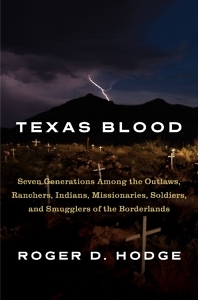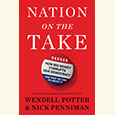From a Brutal Land
Roger D. Hodge guides readers through a history of violence and hope on America’s bloodiest border
In the opening chapter of Texas Blood: Seven Generations Among the Outlaws, Ranchers, Indians, Missionaries, Soldiers, and Smugglers of the Borderlands, Roger D. Hodge recalls two incidents from his youth. One is a brief moment of cruelty propagated by two brothers in childhood. The second is a tale from Hodge’s first summer job as a twelve-year-old ranch hand charged with collecting the carcasses of sheep accidently killed in stock pens. Both events occurred within the larger context of a brutal Texas landscape that permeated every part of Hodge’s childhood and teenage years, an atmosphere in which blood and death are never strangers. Such conditions were common when human beings first settled the desert lands along the Rio Grande River, and they persist to this day.

Despite harsh conditions, the land has inspired both love and loyalty from its inhabitants for generations—a sentiment that Hodge still holds himself, even after leaving his Texas homeland behind for college at the University of the South in Sewanee and a literary career in New York. Years later, on a trip home to visit relatives, he came to a realization:
As I stood there, surveying the vistas of my birthright, standing in a place where seven generations of my family have gazed over the same hills and valleys, I realized that my knowledge of my forebears and their contemporaries, their motivations and their passions, was pathetically thin. So much had happened in this place that I was ignorant of.
That epiphany led to months of research, travel, and interviews as Hodge unearthed the history of his family and the way that tale intertwined with the often bloody story of the borderlands between the United States and Mexico. In Texas Blood, Hodge pulls historical threads back to the first incursions by Spanish Conquistadors and their often violent and sometimes darkly humorous interactions with indigenous tribes, the incursion of American settlers into the Mexican territory, and the various homicidal outlaws and would-be despots who came to prominence in the borderlands. These men had few compunctions against the genocidal acts they propagated and that eventually allowed white civilization to thrive upon the bloody ground of the past.
 Throughout the book, Hodge slides effortlessly between various eras, demonstrating how the past influences the present, a legacy of violence that lives on in the most mundane settings. He often delineates such contrasts with a wit dryer than a handful of South Texas dust: “Pushing on, pushing south, I passed bait shops, cabin rentals, and signs for catfish, all you can eat, and suddenly I crossed the Marais des Cygnes River. That sounded familiar. When I saw a sign for the Marais des Cygnes massacre site, I swerved wildly for the exit and went in search of atrocities. Instead I found a national wildlife refuge and much helpful information about the local flora.”
Throughout the book, Hodge slides effortlessly between various eras, demonstrating how the past influences the present, a legacy of violence that lives on in the most mundane settings. He often delineates such contrasts with a wit dryer than a handful of South Texas dust: “Pushing on, pushing south, I passed bait shops, cabin rentals, and signs for catfish, all you can eat, and suddenly I crossed the Marais des Cygnes River. That sounded familiar. When I saw a sign for the Marais des Cygnes massacre site, I swerved wildly for the exit and went in search of atrocities. Instead I found a national wildlife refuge and much helpful information about the local flora.”
Hodge also focuses parts of the book on our own age, including extended passages on the operations of U.S. Border Security and how twenty-first-century technology and old-fashioned law enforcement techniques are deployed in an effort to secure this rugged border. Other sections of the book chronicle the lives of border inhabitants who struggle to maintain order in an area increasingly beset by drug cartels and outlaws. In the process, it becomes clear that attempting to secure the border between Texas and Mexico is a Sisyphean task.
Equal parts history, memoir, travelogue, and reportage, Texas Blood is a fascinating journey through the heart of darkness at the center of the American dream—a contrast writ large that will never be erased from the brutal and beautiful borderlands of Texas.

Randy Fox is a freelance writer whose writing on music and pop culture has appeared in Vintage Rock, Record Collector, The East Nashvillian, Nashville Scene, Jack Kirby Collector, Hardboiled, and many other publications. He lives in Nashville.


